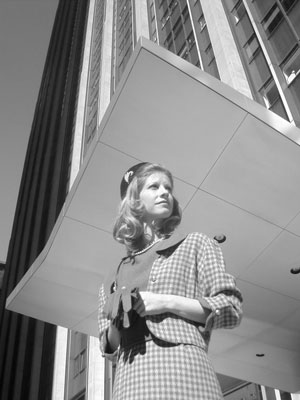By JERRY TALLMER
Well, not quite the only known copy — or, rather, it is a copy, secretly made by her boss, an editor at Life magazine. The original, bought from Zapruder by Time/Life for $150,000 within hours of the assassination, remains in New York in a file known only to the editor and to her. The FBI will never know the difference.
That isn’t what terrifies Lynette Porter. It is the mere possession of the film in her handbag, on the same day that, only a few hours earlier, Lee Harvey Oswald has been shot to death in the basement of the Dallas police station. And the fact that she, Lynette, is one of the only two people who have seen the original film.
“What if they try . . . like with Oswald?” she asks her boss. “So we can’t tell what we saw . . . What if I don’t come back? . . . What if I disappeared without a trace?” The editor reassures her that it’s just a train ride, everything will be okay. “You’ll be back tonight. You just hand over the film and come right back.”
On the train she sweats blood. Why does that man sitting across from her — a man wearing a wristwatch — keep asking the time? Is the train full of them?
“Maybe his watched stopped,” suggests Agent Barry, the cleancut young FBI man who meets her at the Washington, D.C. train station. She demands to see Agent Barry’s I.D., his badge, and scrutinizes it minutely. “Where are we going?” she demands. “Just outside the station, Miss Porter. We have a car.” “Who is this we?” “Another agent.” “From the FBI?” And so on and so forth.
That was 1963. In the 1990s, nearly 40 years later, Lynette Porter — suburban housewife, mother of an exhorbitant adult son and a difficult twentysomething daughter — is still spooked by the 26 seconds of original Zapruder film that no one in this wide world knows remains in her possession.
So there it is. Sounds implausible, no? Sounds cuckoo. That there would have been such a young woman who worked as an editorial assistant at Time/Life in the 1960s, and one day in November of 1963 carried a copy — altered? unaltered? — of the Magruder film from New York City to J. Edgar Hoover in Washington.
Meet Keith Reddin. Actually you can meet him, or at least see him, by going to Primary Stages, where at the moment he’s an actor in A. R. Gurney’s “Strictly Academic.” But we’re talking about Keith Reddin, playwright (same guy), who now says:
“I wrote ‘Frame 312’ around two years ago, after I’d met an actual woman who had indeed worked at Time/Life in the 1960s. She was one of the first people who, with her editor, watched the Zapruder film, and, yes, when the FBI asked to see the film, it was she who took it, in her handbag, by train, to Washington and J. Edgar Hoover.
“It’s all true. An amazing story. And in fact she’s a relative of mine, a distant relative whom I did not know. She lives somewhere in the South, that’s all I should say, and is a housewife and does have children. I told her I might want to write something about this someday. I did a lot of research, and then when I sent her the finished play, she said: ‘It’s good that these questions are being raised.’
“She’s totally convinced that there was more than one assassin, and that the government is involved. I don’t buy that,” says Reddin, “but she does. She’s still traumatized by the whole thing.”
The Lynette of the 1960s and the Lynette of the 1990s are played by Mandy Siegfried and Mary Beth Peil. The Time/Life editor is played by Larry Bryggman. Completing the cast are Maggie Kiley, Ana Reeder (also to be seen these days in the film “Acts of Worship”), and Greg Stuhr.
If you think all the above is somewhat astonishing, here’s a capper from the life and times of Keith Reddin, who grew up in suburban New Jersey:
When he was 7 years old, his parents got divorced. On a Friday in 1963 his mother was flying out to Reno, Nevada.
“Remember when you had to go to Reno to get divorced? At Newark Airport she took me into her arms and said: ‘Daddy and I aren’t going to be living together any more.’ I started crying. When I looked around, everybody in the airport was crying. I thought it was because my parents were getting divorced.”
The grown-up Keith Reddin, who is half an actor, half a playwright — “I don’t know what I am, any more” — lives on Chambers Street, adjacent to the World Trade Center. He was off in New Jersey on that day, but it certainly reinforces his four decades of emotions in re the JFK assassination.
“You know,” he says, “the interesting thing is that stuff never goes away” — the national trauma from then to now.
Nor did it over Lincoln, an interviewer suggests. Or as Jack Newfield once said about November 22, 1963: “This country went off the tracks that day.”
Had the real-life “Lynette,” carrying that film to Washington, truly been as paranoid, as scared, as in the play?
“Yes,” says Reddin. “You have to remember she did this on the day Oswald was shot in the Dallas police station, surrounded by police — and here she was, carrying the most important piece of evidence in the whole country. I’d say she had the right to be irrational.”
The prolific Reddin, by the way, has another drama waiting for someone to produce it. Titled “But Not for Me,” it’s about Richard Nixon’s vicious red-baiting campaign running for Congress from California against Helen Gahagan Douglas in 1950. “I can’t find anyone who’ll touch it.” He named a well-known, forward-looking California theater company. “They turned it down. Too risky.”
Conspiracy theory, anyone?

































